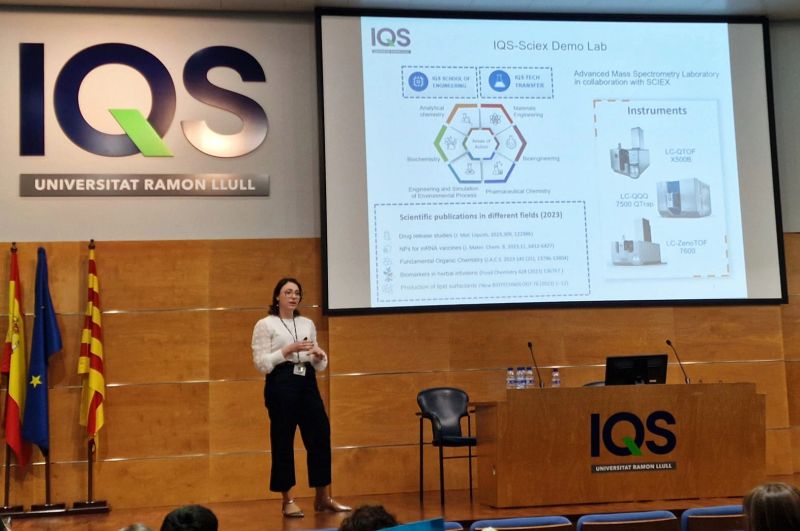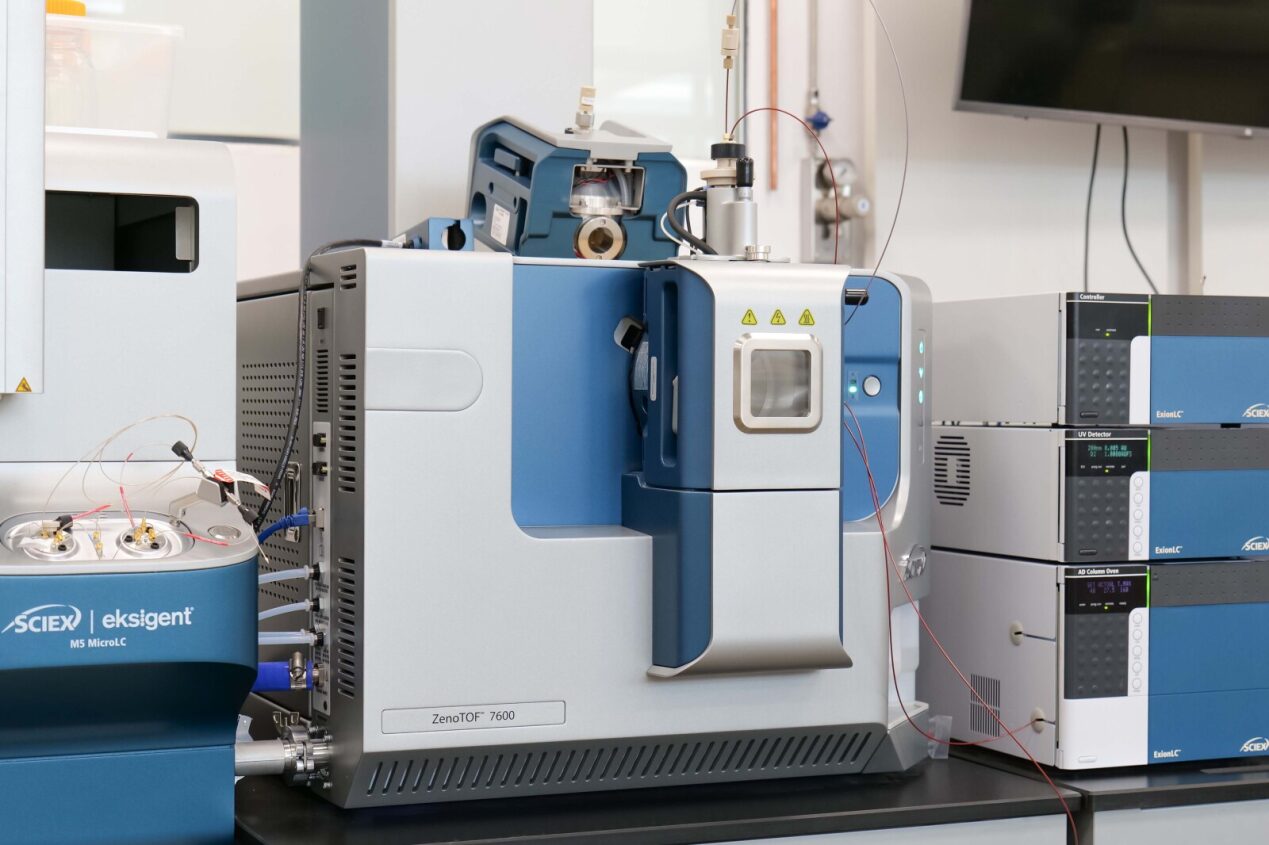Thanks to the collaboration agreement signed between SCIEX and IQS in 2021, the IQS SCIEX Demo Lab has recently incorporated a new high-resolution and ultra-high-range mass spectrometry instrument, the ZenoTOF 7600 System. This device will expand the possibilities of advanced research and the offer of technology transfer services to industry.
It is a QTOF high-resolution mass spectrometer with ion trap coupled to electron-activated dissociation (EAD) fragmentation technology, connected to an ExionLC liquid chromatography system and an M5 microLC microflow system. This system combines the advantages of high-resolution mass instruments with the sensitivity of the highest-end triple quadrupoles, thus allowing new information to be obtained for structural elucidation and providing another degree of certainty to the results obtained. Up to 20 times more ions can be detected in each experiment, compared to other QTOF instruments, and a spectrum of adjustable fragmentation techniques can be accessed to unlock new perspectives for each molecule. Furthermore, by harnessing the power of the data-independent acquisition (DIA) of the Zeno SWATH method, the MS/MS spectra of the least abundant species in a complex sample can be significantly improved quickly and robustly. The great versatility offered by the modular architecture of this system allows users to easily change the ionization probes and they can work in both ESI and APCI mode, allowing the analysis of a wide range of compounds of a very different nature.
For all these reasons, the ZenoTOF 7600 System has great potential in rather varied applications and in vastly different sectors. It is an ideal system for laboratories in which demanding applications are used that require maximum sensitivity to identify key compounds, such as biomarkers or impurities, for small and large molecules.
Key developments of the SCIEX ZenoTOF 7600 System
The Zeno ion trap, EAD fragmentation technology, and the Zeno swath data acquisition method are the three main key developments of the new ZenoTOF 7600. This high-resolution mass spectrometry solution combines MS7MS sensitivity and orthogonal fragmentation technology and:
- It makes it possible to overcome the deficiencies of the QTOF MS/MS work cycle, which implies more than 90% of ions injected into the TOF, sensitivity gains of up to 5-20 times with the pulsation of the Zeno trap, and identify and quantify low-abundance species.
- It enables the application of adjustable fragmentation for all types of molecules as it uses controlled electron-activated dissociation (EAD).
- It provides MS/MS scan rates up to 133 Hz: improved SWATH DIA, DDA, and MRMHR.
With these improvements, it is possible to characterize large proteins, including post-translational modifications, elucidate positional isomers in small molecules and lipids, identify and quantify proteins and peptides at an unparalleled rate, and achieve significant sensitivity to discover less abundant ions.elocidad incomparable y conseguir una sensibilidad significativa para descubrir los iones menos abundantes.
Applications of SCIEX instruments at IQS
The new ZenoTOF instrument has been added to the other advanced high-resolution mass spectrometry equipment previously installed in the IQS Sciex Demo Lab: X500B QTOF System and 7500 QTRAP ®. Since 2021, and under the scientific direction of Dr Margalida Artigues, the devices in this laboratory have contributed significantly to the implementation of various projects in the different research groups at the IQS School of Engineering. Thus, we find the following applications of these instrumentation techniques in the:
- Synthetic design of new aromatic structures with hypervalent halogens (CRISOL group), with applications in the pharmaceutical industry. CRISOL Group.
- Development of peptides and antibodies for application in the transport of biotherapies across the blood-brain barrier. Presentations at different conferences. ChemSynBio group.
- Construction of synthetic microalgae for the sustainable production of rhamnolipids and biosurfactants. GQBB group.
- Functionalization of mRNA vaccines with mannose as a new strategy for the vectorization of polymeric nanoparticles. GEMAT and GQBB groups.
- Polymeric nanoparticle formulations with doxorubicin. GEMAT group.
- Analysis and characterization of mRNA for applications in biotherapeutic oligonucleotides. Presentations at the XXI Scientific Meeting of SECyTA 2022. GEMAT group.
- Analysis of phenolic compounds and minerals present in herbal drinks. Department of Analytical and Applied Chemistry – EQBA group.
- Studies of volatile organic compounds in cultural heritage conservation. Presentations at the XXI Scientific Meeting of SECyTA 2022. Department of Analytical and Applied Chemistry – Chromatography Section.
- Development of a methodology for the analysis of cyanotoxins. Presentations at the XXI Scientific Meeting of SECyTA 2022. GESPA group.
- Development of new drugs against neurotoxic agents. Presentations at the XXI Scientific Meeting of SECyTA 2022. Department of Analytical and Applied Chemistry – GESPA group.
Some of these lines of experience were presented at the two seminars held at IQS on 9 and 16 April 2024 – MetaboSciex Seminar and Foodie Sciex Seminar – focused on Metabolomics within the Pharmaceutical, Food, and Water sectors. en los dos seminarios que se celebraron en IQS los días 9 y 16 de abril del 2024 – MetaboSciex Seminar y Foodie Sciex Seminar – enfocados a la Metabolómica dentro de los sectores Farmacéutico, de Alimentación y de Aguas.











